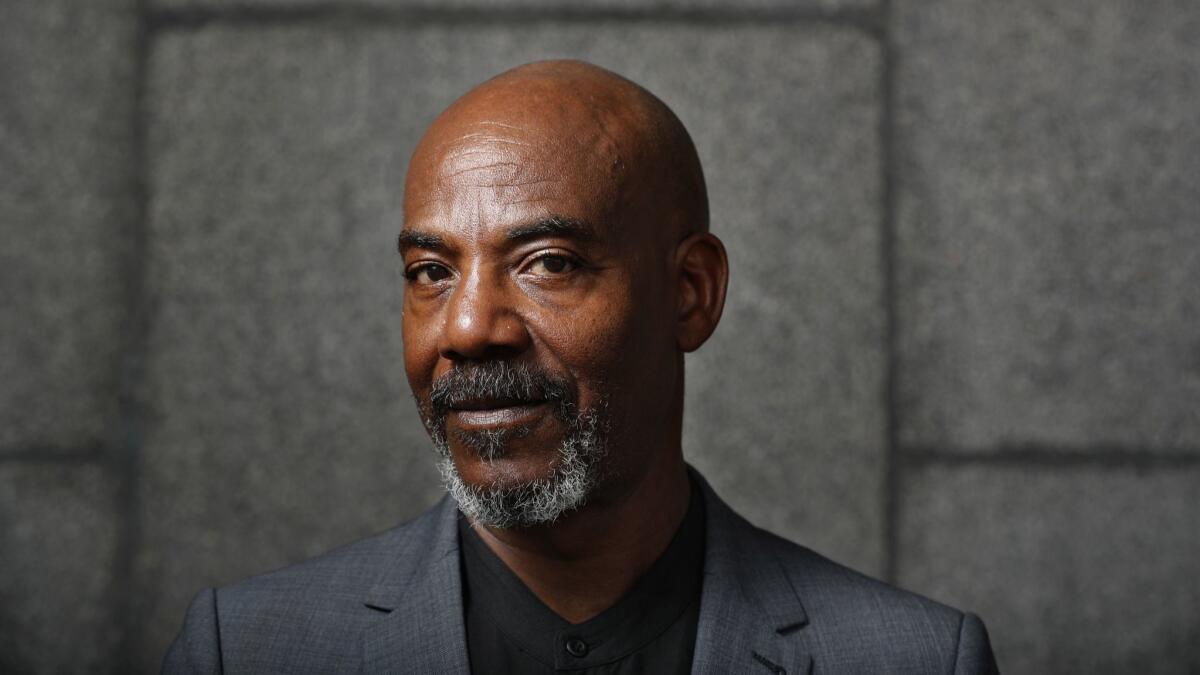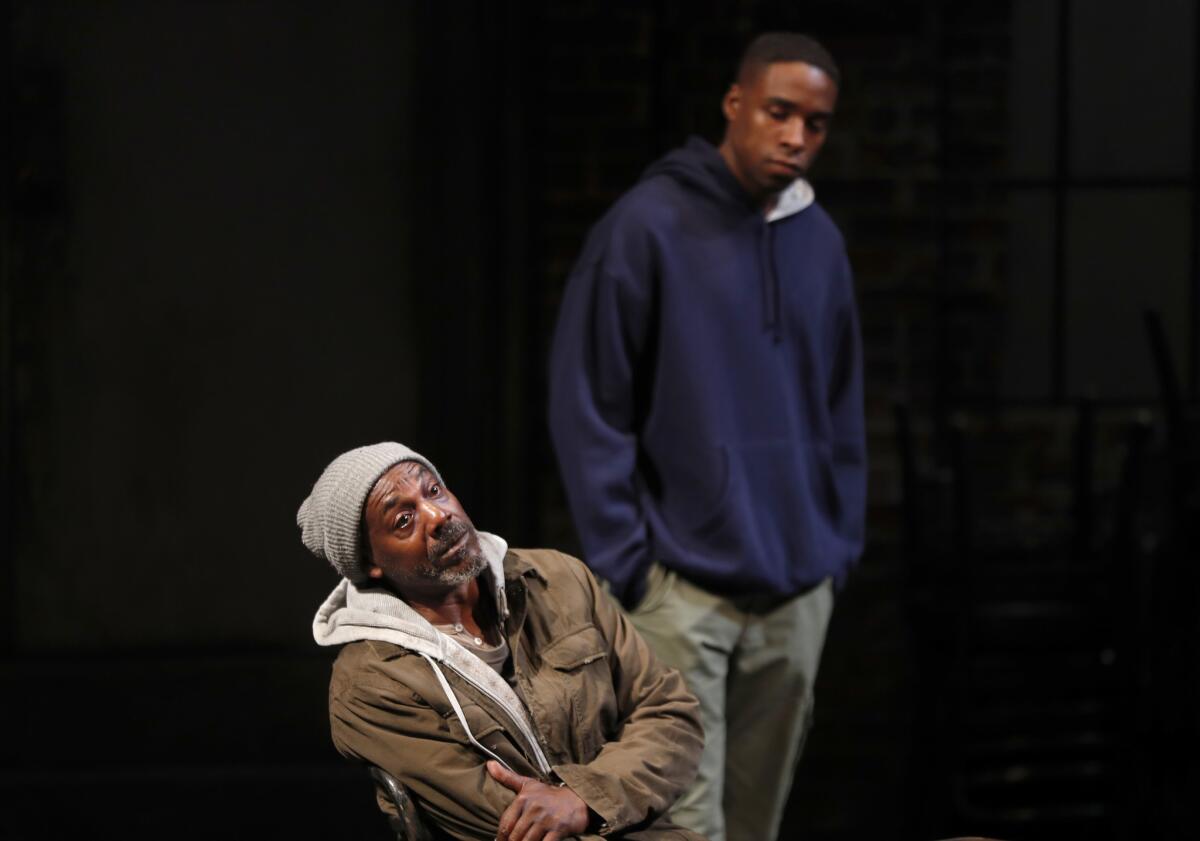For actor John Earl Jelks, two years of ‘Sweat’ yield no easy answers in Trump’s America

- Share via
When John Earl Jelks is onstage, he begs for money from his estranged wife and college-bound son without shame, an emotion reserved for those who can afford it. Jelks is playing a middle-aged man who’s been unemployed for two years and counting, pushed out of the factory where he dedicated his three best decades. “Full circle, a lifetime, and be the same place I was when I was 18,” he laments. “I run the full mile, I put in the time, do the right thing. Don’t get me wrong, I had some good years. But, tell me what I did wrong, huh?”
And then, an unvarnished moment of truth: “I don’t know what to do.”
Welcome to the desolate world of “Sweat,” the Pulitzer Prize-winning play that spotlights the small-town casualties of globalization — the working class of America’s manufacturing industry, their benefits and pensions replaced by efficient machines and nonunion employees. For these characters, every hour is an 11th hour.
In previews now and opening Wednesday at the Mark Taper Forum, “Sweat” zooms in on the Pennsylvania town of Reading, America’s poorest city in 2010 census data. Lynn Nottage wrote the play after interviewing nearly 100 residents of the community where, due to the evaporating opportunities in the textile and auto-related trades, 41.3% of the 88,000 residents were living in poverty.
Forgotten people are always gonna go toward something that gives them hope.
— John Earl Jelks, on why he thinks the factory workers represented in “Sweat” voted for Donald Trump
“If you live in L.A. or New York or Chicago or one of these major cities, you don’t really think about these people, but 100 miles outside of any of these places, life is so different,” Jelks says. Some of these people don’t think they matter because of the work they do, even though we all use the products that they make, Jelks says. These people get up every morning and work for years at these factories, but then the factories leave town. The people? They stay, hoping the factories will come back.
The politically prescient play, set in 2000 and 2008, outlines the inevitability of the 2016 election. First presented at the 2015 Oregon Shakespeare Festival and later at Arena Stage in Washington, D.C., “Sweat” was in the midst of a twice-extended off-Broadway run at the Public Theater when Donald Trump won the presidency.
In a column headlined “Who are these Trump voters? For a thoughtful portrait, turn to playwright Lynn Nottage’s ‘Sweat,’” Times theater critic Charles McNulty wrote: “Nottage helps us see that though this community may feel abandoned and culturally isolated, it isn’t all that disconnected from the multicultural patchwork that is the United States. The economically disenfranchised of all races and ethnicities, it turns out, have a good deal in common.”
Jelks, who was part of that Public run, recalls the aftermath of the election.
“When we got to work the next day, we were amazed to find out that [Reading] was the exact area that pushed him over the top,” he says. “How did we end up forgetting about these people? Because that’s what happened. We basically alienated them to the point where they said, ‘OK, well, my vote matters.’ These people didn’t vote for Trump because they really loved him but because they believed that he was gonna change things and bring those factory jobs back. Forgotten people are always gonna go toward something that gives them hope.”
Before beginning a Broadway run last spring, the cast visited Reading for a volunteer performance, using makeshift props in a community auditorium. Afterward, Jelks recalls, audience members wanted to talk but mostly ended up crying, moved by the sight of their story being given a stage.
“For the actors, it made us connect the dots in a way that, on Broadway, we knew we could just tell a story,” Jelks says. “These are real people, and they’re just living their lives.”

At the Taper, the thrust stage will be home to the bar where generations of factory workers unwind after a long day or gripe about a hard-knock life. Will an L.A. audience connect with the plight of America’s industrial heartland? Jelks isn’t so sure, noting the reaction he felt the play received on Broadway.
“It had just won the Pulitzer, so people just wanted to see what it was about, [but] they didn’t really … care,” the actor says, tossing in an expletive. He worries the high price of tickets means the people who could relate to the story the most are the least likely to see it. In cities where “Sweat” will play, he says, the audience inevitably will be largely people who “have never lost a job and have never been without food or lights or gas.”
“Will they really understand not just the language, but the whole concept and who these people really are?” Jelks wonders. “I don’t know. I’m hoping that they do.”
Still, director Lisa Peterson says the bigger questions of “Sweat” will resonate anywhere.
“The economic desperation is nationwide,” she says. “The play was written before this current administration, but it seems to have predicted it. I hope the audiences come out with just a little bit more understanding of the forces at work in the country that may have gotten us in a place where people who have lost their jobs just feel so ignored and might make a desperate choice.”
After this L.A. run, “Sweat” will play a free month-long run through 18 cities — a tour strategically timed for the weeks before the 2018 midterm elections and in 18 counties where the 2016 election was closely contested. Jelks is in negotiations to reprise his role on the road, “just so I could see the reaction of people around the country. I want to connect with these people, I want to see them. We cannot let this happen again.”
♦ ♦ ♦ ♦ ♦ ♦ ♦ ♦ ♦ ♦
‘Sweat’
Where: Mark Taper Forum, 135 N. Grand Ave., L.A.
When: In previews now, opens Wednesday, ends Oct. 7; performances at 8 p.m. Tuesdays-Fridays, 2:30 and 8 p.m. Saturdays, 1 and 6:30 p.m. Sundays (check for exceptions)
Tickets: $30-$99 (subject to change)
Info: (213) 628-2772 or www.centertheatregroup.org
See all of our latest arts news and reviews at latimes.com/arts.
More to Read
The biggest entertainment stories
Get our big stories about Hollywood, film, television, music, arts, culture and more right in your inbox as soon as they publish.
You may occasionally receive promotional content from the Los Angeles Times.











